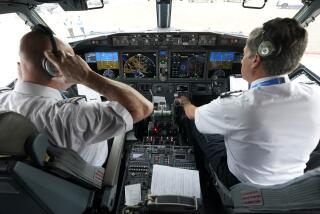NASA mental exam a one-time deal
- Share via
BALTIMORE — NASA astronauts undergo a psychological assessment when they join the space agency, but they face no further evaluations during their careers unless issues arise during their annual flight physicals, the space agency said Tuesday.
“No other psychological assessments are done for shuttle astronauts after that initial one unless a concern is raised,” said NASA public affairs officer Katherine Trinidad.
Navy Capt. Lisa Marie Nowak’s problems slipped beneath NASA’s radar and surfaced Monday in a meltdown and alleged assault on Air Force Capt. Colleen Shipman in a parking lot at Orlando International Airport. She is believed to be the only astronaut to be charged with a felony.
“There is no instance like this I’m aware of in the history of the astronaut corps,” said Roger Launius, chairman of the space history division at the National Air and Space Museum in Washington.
In general, the screening system has worked. There have been blowups and infidelities among the astronauts, well-described in memoirs and books such as “The Right Stuff,” Tom Wolfe’s account of the first Mercury crews, Launius said.
But given the length and intensity of the astronauts’ mental and physical training, the risks they take and the toll on their families, he said, the real news may be that such personal train wrecks haven’t happened before.
“This is a different sort of story, and everybody’s looking at it right now,” Launius said.
Trinidad said she was unable to provide more information about the initial psychological “assessment” that astronauts undergo.
She said astronauts training for a long deployment aboard the International Space Station receive a “slightly different assessment since they are in space a longer amount of time.” But she offered no specifics.
Working astronauts have access to NASA flight surgeons who make sure they remain fit. Those doctors can refer astronauts to a “behavioral health and performance provider” at Johnson Space Center in Houston.
No one has publicly ascribed a psychological malady to Nowak. But her behavior suggests a syndrome seen among high achievers, called “narcissistic personality disorder,” said Maryland psychiatrist Dr. Jack Vaeth.
Thwarted in their ambitions or conquests, people accustomed to success, adulation and entitlement may slide into a rage or a disastrous series of decisions that can bring down their careers.
Vaeth teaches and practices at the Sheppard Pratt Health System hospital in Towson. He has no special knowledge of Nowak’s case but plenty of experience with self-centered achievers.
“Certain professions are made up of narcissistic personalities, although maybe not disordered ones,” Vaeth said. They include doctors, lawyers and CEOs, “high achievers who feel ‘I have an edge on the world, and society rewards me for it.’ ”
“They were always the teacher’s pet, their parents’ favorite child,” he said, “so of course they’re going to want to continue that. Everything they undertake, they’re winners. And even when they lose, they learn to win better next time.”
In time, they come to believe that they’re entitled, invincible, “able to exploit others without being called to the mat for it.”
Nowak, who has three children but recently separated from her husband, is the epitome of a high achiever.
She is a U.S. Naval Academy graduate with a masters degree in aeronautical engineering; a decorated Navy veteran and test pilot who has logged more than 1,500 hours in 30 different types of aircraft, according to NASA. An astronaut since 1996, she flew on the shuttle Discovery to the International Space Station in July.
More to Read
Sign up for Essential California
The most important California stories and recommendations in your inbox every morning.
You may occasionally receive promotional content from the Los Angeles Times.













